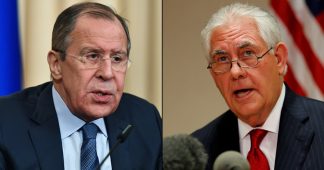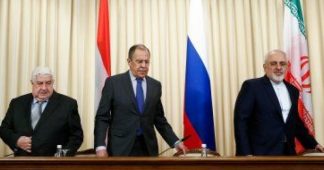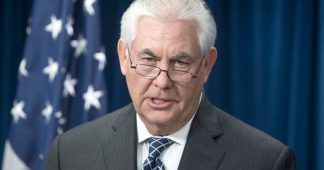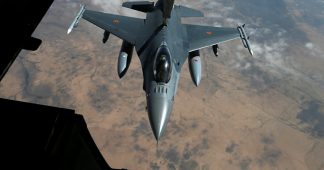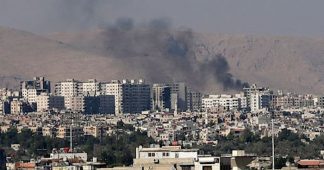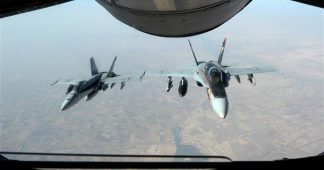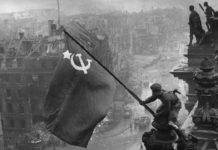By Gilbert Doctorow
From time to time, the Kremlin uses the Sunday evening weekly news wrap-up program of Dmitry Kiselyov on state television channel Rossiya-1 to send blunt and public warnings to Washington without diplomatic niceties.
Last night was one such case and we must hope that the intended audience within the Beltway can put aside its focus on Russia Today’s supposed fake news long enough to read a real message from Moscow.
The last such message came in the week following the April 8th Tomahawk attack on a Syrian air base that Donald Trump sprung on the world, allegedly to punish the regime of Assad for a chemical attack on a village in Idlib province.
Kiselyov used his airtime then to spell out the Russian response, which he characterized as unprecedented in scope and seriousness. It was essential to put all of its elements together in one place, as he did, because our boys in the Pentagon chose to downplay one or another element in isolation, such as the Russian installation of their Iskander nuclear potential missiles in Kaliningrad, or the abrogation of the deconfliction agreement relating to air space over Syria, or the dispatch of still more Russian vessels to the Eastern Mediterranean equipped to sink our Navy.
While our generals were saying that the Russians didn’t really mean it, Kiselyov put the whole picture on the screen: an ultimatum to Washington to back off or be prepared for war.
A still earlier message of this kind to Washington aired on the Kiselyov Sunday news show in the week following the supposedly accidental US and allied bombing of Syrian army positions in the encircled eastern town of Deir Ezzor, which killed more than 80 Syrian soldiers and prepared the way for a renewed offensive by the siege forces.
That bombing scuttled the agreement on a Syrian cease-fire concluded with the approval of Barack Obama less than a week earlier by Russian Foreign Minister Sergei Lavrov and US Secretary of State John Kerry after a 14 hour negotiating session.
Lavrov was shown on the Kiselyov program openly accusing US Secretary of Defense Ashton Carter of directing “friendly fire” against Kerry and of dangerous insubordination to his boss, the US President, which put in question any possibility of reaching agreements with the Americans on anything.
That last charge has now again re-emerged in the program that Kiselyov presented yesterday. The Americans were identified as the “main obstacle” to the mopping up operation in Syria, at a time when “the light at the end of the tunnel” is visible [Kiselyov’s characterization], when more than 90% of the Syrian territory is under government control.
To wit, the United States is secretly aiding the terrorists: supplying them with weapons, helping them to move around, removing them from under hostile fire, giving them the findings of aerial reconnaissance, maps of where Syrian government forces are operating and even the locations of Russian military detachments.
Things have gotten to the point where it is not the military capability of the Islamic State but the American assistance which stands in the way of the total liberation of Syria from terrorists.
This, says Kiselyov, is not his own idea: it is the official position of the Russian Ministry of Defense as issued through its spokesman this week, Igor Konashenkov.
Kiselyov resumes:
The Americans deny everything. But the RF Ministry of Defense does not believe their words, relying instead on facts. We recall in the past week how part of the main road connecting Palmyra and Deir Ezzor was taken over by the fanatics.
This is the main artery supplying the Syrian forces leading the offensive from Deir Ezzor against the remaining forces of the terrorists in Syria. De facto this was an attack in the rear. This was planned and facilitated by the Americans.
In parallel, on 28 September a large group of terrorists numbering about 300 men left the area of the American base in Et Tanf at the Jordanian border. In this area there is a refugee camp numbering tens of thousands.
Per Kiselyov, the Americans have cut off the refugee camp, not allowing in UN or other humanitarian relief convoys, so as to use the camp as cover, a human shield, for the Islamic State fighters they are supporting.
Then comes the direct warning from Konashenkov: If the US forces see these attacks by mobile units of terrorists they are assisting as “unforeseen random events,” then Russian armed forces in Syria are prepared to totally destroy all such random events directed against the zone under their control.
Kiselyov asks why is this happening? Did Trump decide this?
The question is rhetorical. Trump is exculpated. It may be “amazing,” but it appears that Trump was not a party to this. More likely it is due to what he calls sloppy management, when the military gets out from under political control, and then on the territory of Syria, “they start wandering around quite on their own” and “flirting” with the terrorist groups.
Whatever the case, says Kiselyov, the result is extremely unpleasant both for Russia and for the American leadership as its generals are being pushed towards adventurism.
Konashenkov characterized the area in Syria under American control near the Jordanian border as a “black hole” that is 100 km long. From this black hole, like devils escaping from a snuff box, the terrorists come out to stage their attacks on Syrian troops and against the peaceful civilian population.
The feature segment moves on to a calm note, with insistence that Putin remains confident in the victory over the terrorists regardless of who is aiding them.
To demonstrate this Olympian calm, which comes from certainty of victory in the near future, we are shown footage of Putin’s response to questions put to him at the Energy Forum in Moscow at mid-week.
Putin tells us that:
“in the end, we all [presumably including the Americans] have common interests in securing Syria and the region against terrorists and that will bring us together for cooperative action.”
In the meantime though, we are treated to videos showing the consequences of Russian air activity in Syria this past week.
That included more than 400 sorties of Russian planes based in Syria, plus bombing by SU 134 and 135 arriving from Russian territory that killed a dozen or more terrorist leaders together with 50 security personnel and seriously injured their top official, who lost an arm and sank into a coma.
Russian air attacks destroyed the terrorists’ main underground weapons caches amounting to a thousand tons. And an attack by Kalibr cruise missiles launched from submarines in the Mediterranean destroyed Islamic State command installations and vehicles as well as weapons supplies. This cleared the way for Syrian troops to move to liberate the town of Meyadin.
The dots are left unconnected, but the Russian threat is clear: they will use their air power to eliminate all forces standing in the way of their complete victory including US forces on the ground near the Jordanian border.
The same news round-up last night also had another segment that relates in less direct fashion to the coming Russian victory in Syria: this was a week when the king of Saudi Arabia made the first state visit to Russia in their 90 plus years of diplomatic relations. And it was not a simple affair.
Salman bin Abdulaziz Al Saud brought with him a suite of 1,000, including business leaders, ministry officials and senior military. We are told they came with 100 tons of baggage, including favorite carpets and other necessities of life.
All aspects of this visit were impressive, including the signing of contracts and letters of intent for multi-billion dollar joint investments in industrial projects in both countries, possible Saudi purchases of Russian Liquefied Natural Gas from yet another mega-project seeking financing and multi-billion dollar military procurement, said to include the latest S-400 air defense system that Russia agreed to supply to Turkey a few weeks ago in exchange for a 2.5 billion dollar down payment and which Turkey accepted gratefully over NATO objections.
Putin quipped to the moderator of the Moscow Energy Forum also held during the past week that nothing is forever, not even the U.S. hold on the Saudis.
Kiselyov placed the visit in the context of Russian foreign policy in the region generally. Putin, he said, is pursuing a policy of seeking peaceful harmony in the Near East that takes into account the balance of interests of all countries in the region, a policy which is paying off:
Russia is now the only country in the world to have good relations with Saudi Arabia, Iran, Israel, Turkey, Iraq and, of course, Syria.
From both segments it would appear that US domination is unraveling.
Published in russia-insider.com
